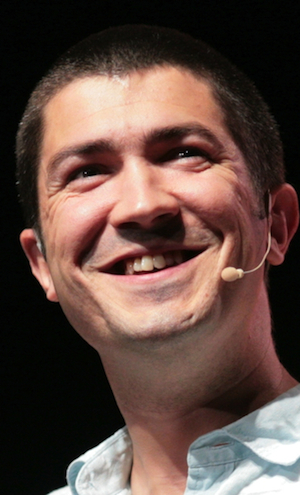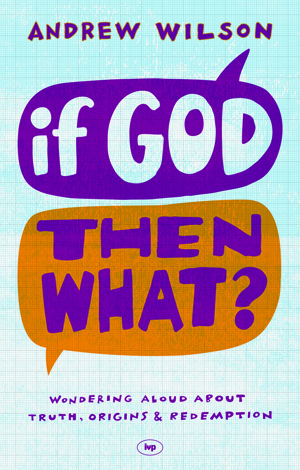Author Andrew Wilson: 'If God Then What?'
Sam Hailes
Described as an "impressive young Christian" by The Times, Andrew Wilson tells all about tackling Richard Dawkins, describing the character of God, and writing his new book: If God Then What?

Holding two theology degrees and currently studying for his PhD, Andrew, 33, also regularly blogs on the Newfrontiers theology website What You Think Matters. He lives in Eastbourne, where he is an elder at Kings Church and is married to Rachel. They have two young children, Zeke and Anna.
1. Your first book was Deluded by Dawkins? - a response to Richard Dawkins' book The God Delusion. What made you write it?
I was at a Sussex leaders gathering at 11 o clock in the morning and Julian Adams picked me out of the room and said: ‘I believe God says a publisher is going to approach you and ask you to write a book, and that is the book you must write. I opened my email and at 9 o clock that morning I’d had an email from the publishers saying 'we’d like you to write a book about Dawkins'.
[Dawkins book] wasn’t a serious intellectual case for atheism, it was much more of a bombastic rabble-rousing kind of book. The more highbrow the publication that reviewed it, the less they liked it.
At a popular level it was very influential. So I wrote the book for those people, rather than go in at a more intellectual level.
2. What led you to write Incomparable?
It was something I wanted to do ever since I first heard Judson Cornwall speak on the names of God at Malvern Bible week in 1988. I wanted to write short chapters, each on an aspect of God.
When it was launched it sold quite quickly and got picked up by a couple of key movement leaders like Terry Virgo and Mike Pilavachi who pushed it. It’s still selling well now both in America and here.
3. What was God Stories about?
It’s espresso theology, trying to condense a picture of the gospel into each chapter.
Both Incomparable and God Stories have chapters you can read on the toilet if you want to! One guy I know read them while he was running his bath. He’d turn the taps on, read a chapter and by the time he finished the chapter, he turned the taps off and got in the bath.
4. Tell us about your latest book:If God Then What?
If God then What? sounds like a conversation rather than a debate. In the opening chapter I talk about the dangers of the debate format for reasoning through Christianity. It can turn into trench warfare.
It’s the content of Tim Keller’s The Reason for God but written in the style of Donald Miller writing Blue Like Jazz. It’s a Bill Bryson style book, but journeying through questions of spirituality, faith, redemption and origins.
There’s lots of stories and reflections from things across the world and culture. The whole book is structured around questions that I ask, rather than answers to questions.

5. What is your PhD in and how is it going?
It’s on the warnings and assurances mentioned in 1 Corinthians. Trying to understand why Paul says ‘if you do the following things you will be judged’ and at the same time ‘you’re going to be absolutely fine, God will preserve you’. Why does that tension exist?
I find it fascinating how the sovereignty of God and the responsibility of his people interact. I’m increasingly thinking that our systems of Calvinism and Arminianism don’t resolve things that the Bible intends us to resolve. I’m quite enjoying that existential journey while at the same time having a book that’s coming out that’s very apologetics based.
6. You’ve been blogging on What You Think Matters. What has that been like?
It’s been a new thing for me this year. I had never blogged before. I love it, I have an iPad now so I do it on trains, or in coffee shops.
It’s been fantastic because it’s being read in 146 countries and some of the bigger American blogs have linked to it. It’s exciting to feel like this is part of shaping a global conversation.
7. Some are concerned people are listening to preaches on the internet through podcasts, more than hearing their local church leaders. Is this a problem?
It’s a difficult one to disentangle because you don’t want to ban people from listening to things online and very few leaders would be so megalomaniac to insist nobody in the church listens to anybody else.
At the same time often those most connected into the virtual world are among the least likely to have the maturity to bed-in a specific community and receive instruction and discipleship.
I’d be horrified to find out that someone was listening to me and as a result was not receiving direction and theology from their [local church] elders. I don’t think that’s ever a good model.
8. You’re often praised for communication skills and making difficult subjects easy to understand. Why are you good at this?
The reason I do it the way I do is Kidz Klub. In 2001 I did a gap year working for the church and had to do a kids club every week. You’d have a Bible verse and a story you’d have to communicate to 200 kids who had been bused in from local council estates.
You had to use an object lesson and explain why this thing linked to the message we were portraying. When I started preaching to adults, I never stopped doing that. The idea of connecting people visually is true across the board. I spend a lot of my sermon preparation time thinking hard about what will be the key visual.
9. What has God been teaching you recently?
Fighting for joy in God all the time. I love teaching on it but I still find a daily, weekly, monthly challenge of saying ‘I want to be happy in God’. The most life-changing sentence I’ve ever heard is George Muller’s ‘the first thing I must do every morning is get happy in God because until I am, I’m no use to anyone’.
10. What’s the best Christian book you’ve read?
The Pleasures of God by John Piper is the book that expanded my mind the most. I wouldn’t now agree with everything in it but I found it was such a transforming book. It completely changed the way I saw the sovereignty and happiness of God. There’s many books by Tom Wright, Donald Miller and lots of other people that have really shaped me as well.
Latest Blogs

Children
Exploring the Nativity Story - Christmas Books for Children
15 Top Christmas Books for Children The Nativity story is a cherished part of Christmas traditions worldwide. It tells children the true story of Jesus' birth in a simple and inspiring way. My guide to the best Christmas books for kids is full of engaging, timeless stories for the whole family. From fun stories with bright pictures and activity books, these titles help your kids learn the true meaning of Christmas.

Children
10 Christmas Activity Ideas for Families
My guide to Christmas activities will help your family come together. You can enjoy festive fun and find moments of peace and quiet.

Bibles
Study Bible vs. Devotional Bible: Which One Should You Gift?
Learn the differences between study Bibles and devotional Bibles to help you choose the perfect Bible gift, whether for in-depth study or daily inspiration.

Bibles
Is the KJV Bible Suitable for Study Purposes?
Is the KJV Bible good for study? Learn how the KJV is a great choice for deep Bible study with its accurate translation and rich history, with study tools available at Eden.

Bibles
Why should I choose a KJV Bible over other translations?
Explore why you should choose the KJV Bible over other translations, with its majestic language, deep connection to Christian tradition, and word-for-word accuracy."

Bibles
What is the difference between the 1611 and 1769 versions of the KJV?
Discover the differences between the 1611 and 1769 versions of the KJV Bible, including spelling and punctuation updates that make it easier to read today.
